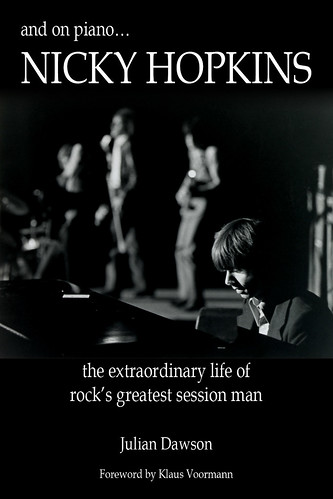 I've been reading And on Piano...Nicky Hopkins
I've been reading And on Piano...Nicky HopkinsBut I wouldn't be surprised if readers of this blog post have never even heard of Nicky Hopkins. And though you may not have heard of him, I have to believe that if you listen to rock music regularly (not dance music, not R&B music, not metal or electronic music, but ROCK music), then you have, indeed, heard him.
Let's see...Do you recognize any of these songs? The Rolling Stones' "Jumpin' Jack Flash" and "Street Fighting Man." The Beatles' "Revolution." John Lennon's "Imagine" and "Happy Xmas (War Is Over)." George Harrison's "Give Me Love (Give Me Peace on Earth)." Jefferson Airplane's "Volunteers" and "We Can Be Together." And Joe Cocker's "You Are So Beautiful."
As you may have guessed, Nicky Hopkins was behind the piano on each of these best-selling singles, just a few of the hundreds of singles, and albums, on which he appeared. In fact, at the end of the book, the author presents a Nicky Hopkins Discography -- 28 small-print pages listing all the albums, singles, live performances, and film soundtracks on which the pianist performed.
Here's a YouTube vid of the man at work:
In the book, Julian Dawson shares a story: while Nicky was touring outside the U.S. someone began impersonating him at various recording studios. Once word got out about this impersonator, session producers learned to ask "Nicky Hopkins" to play his song "Edward," which would reveal soon enough if this person was indeed the real Nicky Hopkins. This is an audio-only vid featuring the song "Edward (The Mad Shirt Grinder)," which Nicky wrote while a member of Quicksilver Messenger Service, for their album Shady Grove (Capitol Records, 1969) -- however, this vid is a live performance of Quicksilver at Stony Brook College, New York, in 1970. A studio recording can always be overdubbed, etc., but one can't overdub a live performance:
Nicky was born in Middlesex, England, on February 24, 1944, during an air raid! He suffered throughout his entire life with health issues, most likely caused by an undiagnosed (at the time) case of Crohn's disease. In fact, at age 19, he spent more than a year in the hospital, recovering from a life-threatening illness from which the doctors never expected him to survive. And, sadly, he passed away at the age of 50, on September 6, 1994, in Nashville, Tennessee, from complications from that life-long battle with the disease.
John York, formerly with The Byrds, from the book:
"I gave [Nicky] a ride to a Jack Bruce session and when we got there Ginger Baker was just leaving. The engineer asked [Nicky] to go in and get a sound and Nicky started playing...and we all sat there and listened to him playing. It was when he was working on music for films and it was like listening to Rachmaninoff or something; at a certain point Nicky stopped, took a last drag on his cigarette, put it out, and said, "OK, mate," and then started playing like some 65-year-old Black guy from the Delta. It was unreal."
Julian Dawson, from the book:
Nicky delivers one of the most elegant and perfectly conceived performances of his career on Let It Bleed's quietest track, "You Got the Silver." Keith Richards' love song to Anita Pallenberg was his first outing as sole lead vocalist and his heartfelt singing, acoustic slide and guitar tracks are perfectly underpinned by Nicky's understated organ and gentle piano. Over the years Nicky often referred to the song as one of his top five favourite performances, a sentiment echoed by Keith and others...."
And one last, albeit lengthy, quote from Julian Dawson:
"Imagine the voodoo groove of the Rolling Stones' 'Sympathy for the Devil' without its driving piano, 'Angie' or 'She's a Rainbow' without their gorgeous fills; the Beatles' 'Revolution' without its perfectly formed solo or the Who's explosive first album without its breakneck keyboard accompaniment. Picture Joe Cocker singing his hit 'You Are So Beautiful' alone and a capella, or try to imagine the strident call-to-arms that is Jefferson Airplane's 'Volunteers' without its keyboard riffs. Imagine...well, 'Imagine' stripped of its beautiful piano work; Lennon's 'Crippled Inside' without the perfectly tailored honky-tonk flourishes or 'Jealous Guy' without its haunting and delicate piano decorations. These are just a handful of classic tracks all played by one man's hands."

No comments:
Post a Comment